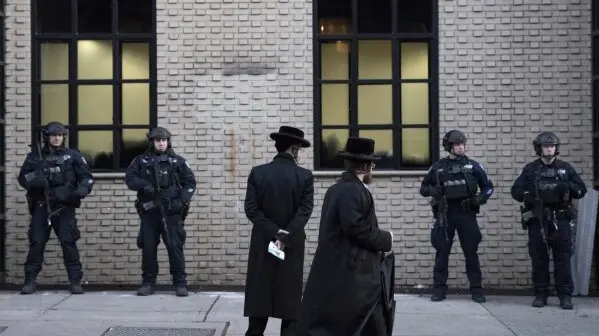Updated 3 May 2024 at 18:46 IST
In US, Bill to Combat Antisemitism Triggers Backlash from Christians and Left Wing Progressives
The Antisemitism Awareness Act, passed by the House with overwhelming support on Wednesday, has prompted backlash from some in the American right wing.
- World News
- 4 min read

A bipartisan effort in Congress to pass legislation aimed at combating antisemitic speech on college campuses has ignited a heated debate over religious freedom, with far-right lawmakers and activists arguing that the proposed law could infringe on Christian biblical teachings.
The Antisemitism Awareness Act, passed by the House with overwhelming support on Wednesday, has prompted backlash from some Republican lawmakers who assert that it may criminalize certain Christian beliefs. The bill, which seeks to define antisemitism and instruct the Education Department to consider it when investigating discrimination allegations against Jews on college campuses, has raised concerns among conservative circles.
In an attempt to target Democrats, Republicans expose divisions within their own party

House Republicans introduced the legislation amidst a surge of pro-Palestinian protests on university campuses nationwide, framing it as a response to what they perceive as the left's tolerance of antisemitism. However, in attempting to use the issue to criticize Democrats, Republicans inadvertently exposed divisions within their own party.
A faction of GOP members, including Representative Marjorie Taylor Greene of Georgia, voiced opposition to the bill, fearing it could lead to the condemnation of Christian teachings. Greene argued that certain passages in the Bible, such as those referring to the crucifixion of Jesus Christ, could be considered antisemitic under the bill's broad definition. The bill “could convict Christians of antisemitism for believing the Gospel that says Jesus was handed over to Herod to be crucified by the Jews," she said, as per a report from the New York Times.
Advertisement
70 Democrats and 21 Republicans opposed the bill

Despite efforts by Republican leaders to capitalize on campus unrest and drive a wedge within the Democratic Party, the legislation has faced resistance from both sides of the aisle. While 70 Democrats voted against the bill, 21 Republicans also opposed it.
Representative Matt Gaetz of Florida labeled the legislation a "ridiculous hate speech bill," claiming that it could criminalize fundamental Christian beliefs. Gaetz argued that teachings from the New Testament regarding the crucifixion of Jesus Christ would fall under the bill's definition of antisemitism. “Did the House of Representatives just make parts of the Bible illegal?” Charlie Kirk, a far-right influencer, asked on Twitter. “Yes. The New Testament,” replied Tucker Carlson, an influential right wing journalist/commentator.
Advertisement
Here is what you need to know

The Anti-Defamation League has long denounced the assertion that Jews killed Jesus as an antisemitic myth used to justify violence against Jews. The Catholic Church and Pope Benedict XVI have also disavowed the belief that Jews bear collective responsibility for the crucifixion.
Despite the controversy, the legislation mirrors an executive order signed by former President Donald Trump in 2019, which relied on a similar definition of antisemitism. Nevertheless, right-wing lawmakers and activists erupted in outrage following the bill's passage in the House, igniting debates over religious freedom and freedom of speech.
Fringe left and right unite?
The bill's opponents, including left-wing Democrats like Representatives Alexandria Ocasio-Cortez, Ilhan Omar, Rashida Tlaib, Cori Bush, and Pramila Jayapal, have also opposed the bill.
As the legislation moves to the Senate, the debate surrounding the balance between combating antisemitism and protecting religious freedom is likely to intensify, underscoring the complex intersection of politics, religion, and civil rights in contemporary America. It is worth mentioning that most evangelical Christians in America and staunch supporters of Israel.
Published By : Sagar Kar
Published On: 3 May 2024 at 18:40 IST
